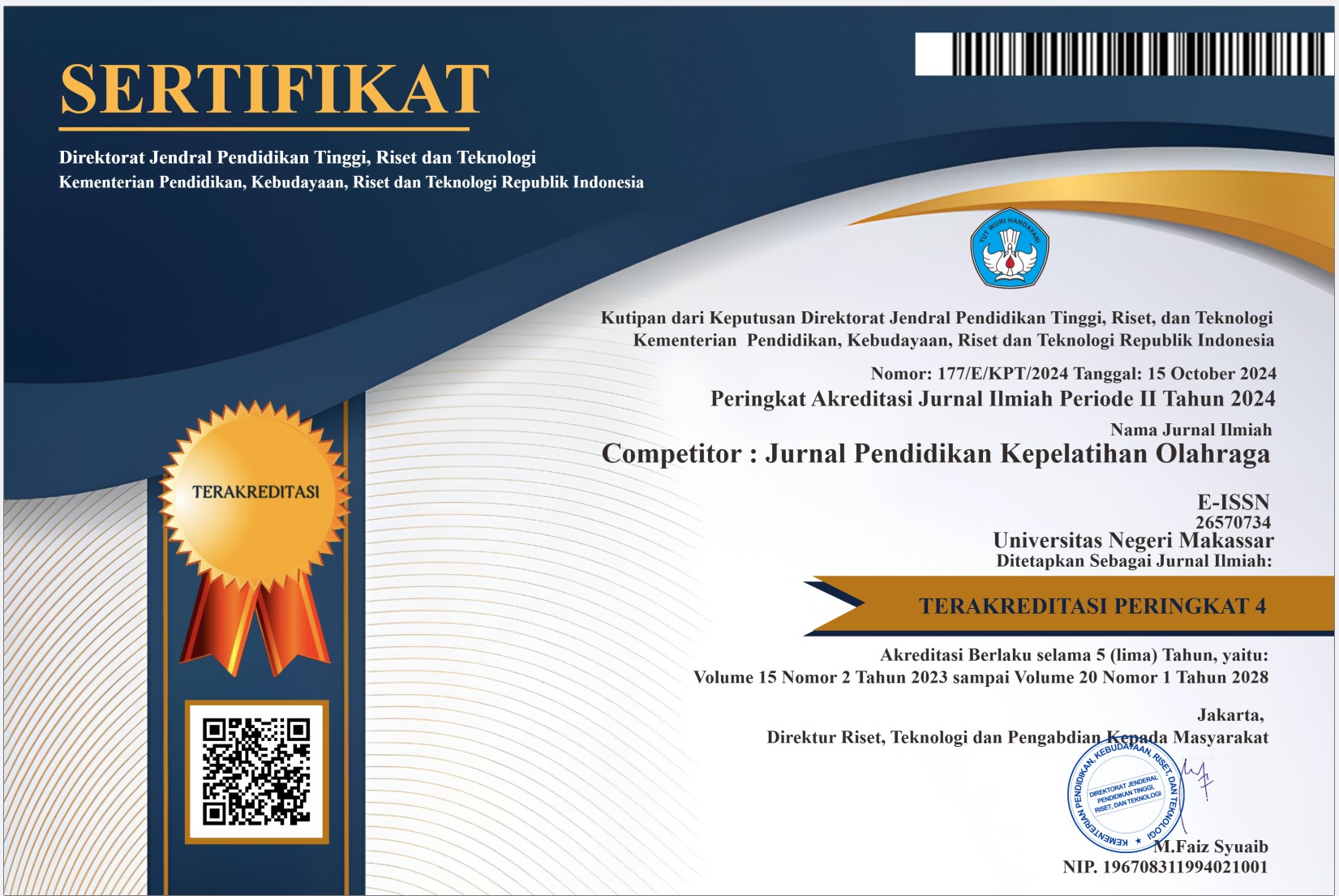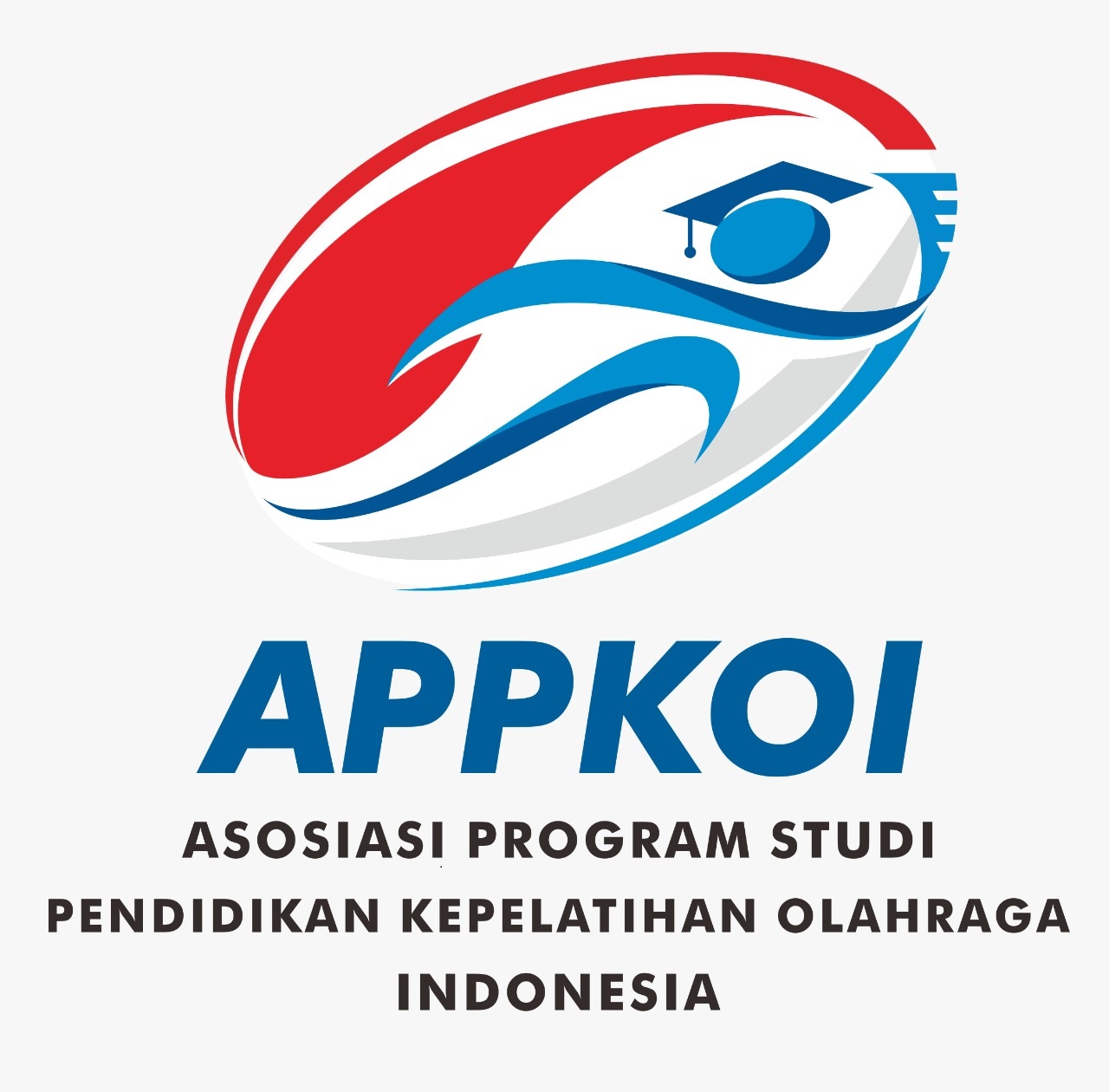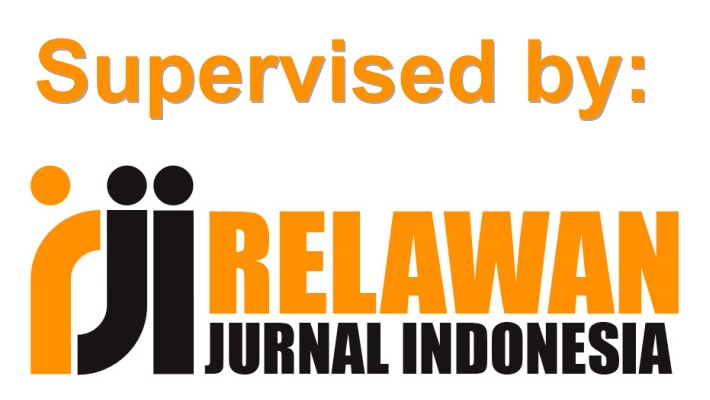The Relationship Between Physical Activity and Learning Outcomes For Upper Elementary School Students
DOI:
https://doi.org/10.26858/cjpko.v17i1.71914Keywords:
Physical Activity, Learning Outcomes, Primary School Students.Abstract
This study aims to determine the relationship between physical activity and learning outcomes of upper-grade elementary school students. Physical activity is defined as body movements that require energy expenditure and is categorized into light, moderate and heavy activities. This study used a quantitative approach with a correlational design. The research sample amounted to 205 students in grades IV to VI who were selected by purposive sampling technique from several elementary schools. The instrument used to measure physical activity was the PAQ-C (Physical Activity Questionnaire for Children) questionnaire while learning outcomes were obtained from students' report cards. Significant between physical activity and learning outcomes with a correlation value of -0.181 and a significance of 0.009. This means that the higher the students' physical activity level, the lower their learning outcomes. This result contradicts some theories that physical activity improves cognitive function and academic achievement. However, this finding can be explained through time management factors and the high intensity of physical activity, which can cause fatigue and reduce study time. This study provides important implications for schools and parents to help students optimally balance physical activity and study time.References
Alawiyah, N., & Ernawati, R. (2021). Hubungan Penggunaan Gadget dengan Interaksi Sosial Anak Usia Sekolah Dasar di SD Muhammadiyah 5 Samarinda. Borneo Student Research, 3(1), 300–309. https://journals.umkt.ac.id/index.php/bsr/article/download/2461/1013
Alfriana, D. (2024). International Journal of Education,Social Studies and Conseling (IJEDUCA) Vol.2, No.1, 2024. 2(1), 1–8.
Aminingtyas, M., & Dwi Wardhani, J. (2023). Hubungan Minat dan Motivasi Belajar Berbasis Portal Rumah Belajar terhadap Hasil Belajar Kognitif Anak. Murhum : Jurnal Pendidikan Anak Usia Dini, 4(1), 590–601. https://doi.org/10.37985/murhum.v4i1.268
Badu, K. M., Sugiharto, S., & Hariyanto, E. (2021). Literatur Review: Aktivitas Fisik Dalam Pembelajaran Pendidikan Jasmani sebagai Stimulus Fungsi Kognitif Siswa. Jurnal Pendidikan: Teori, Penelitian, Dan Pengembangan, 6(12), 1953. https://doi.org/10.17977/jptpp.v6i12.15180
Chaeroni, A., Kusmaedi, N., Ma’mun, A., & Budiana, D. (2021). Aktivitas Fisik : Apakah Memberikan Dampak Bagi Kebugaran Jasmani dan Kesehatan Mental? Jurnal Sporta Saintika, 6(1), 54–62.
Cristanto, M., Saptiningsih, M., & Indriarini, M. Y. (2021). Hubungan Aktivitas Fisik Dengan Pencegahan Hipertensi Pada Usia Dewasa Muda: Literature Review. Jurnal Sahabat Keperawatan, 3(01), 53–65. https://doi.org/10.32938/jsk.v3i01.937
Erickson, K. I., Hillman, C., Stillman, C. M., Ballard, R. M., Bloodgood, B., Conroy, D. E., Macko, R., Marquez, D. X., Petruzzello, S. J., & Powell, K. E. (2019). Physical Activity, Cognition, and Brain Outcomes: A Review of the 2018 Physical Activity Guidelines. Medicine and Science in Sports and Exercise, 51(6), 1242–1251. https://doi.org/10.1249/MSS.0000000000001936
Fauzi, R. A., Suherman, A., Saptani, E., Dinangsit, D., & Rahman, A. A. (2023). The Impact of Traditional Games on Fundamental Motor Skills and Participation in Elementary School Students. International Journal of Human Movement and Sports Sciences, 11(6), 1368–1375. https://doi.org/10.13189/saj.2023.110622
Gaya Hidup Sehat Sejak Dini Melalui Pendidikan Jasmani, M., Kesehatan Agus Mulyana, D., Lestari, D., Pratiwi, D., Mufidah Rohmah, N., Tri, N., Nisa Audina Agustina, N., & Hefty, S. (2024). Menumbuhkan Gaya Hidup Sehat Sejak Dini Melalui Pendidikan Jasmani, Olahraga, Dan Kesehatan. Jurnal Bintang Pendidikan Indonesia, 2(2), 321–333. https://ejurnal.stie-trianandra.ac.id/index.php/JUBPI/article/view/2998
Habsyi, F. Y. (2020). Pengaruh fasilitas belajar terhadap prestasi belajar siswa SMA Nusantara Tauro. Jurnal Pendidikan Dan Ekonomi, 2(1), 13–22.
Haverkamp, B. F., Wiersma, R., Vertessen, K., van Ewijk, H., Oosterlaan, J., & Hartman, E. (2020). Effects of physical activity interventions on cognitive outcomes and academic performance in adolescents and young adults: A meta-analysis. Journal of Sports Sciences, 38(23), 2637–2660. https://doi.org/10.1080/02640414.2020.1794763
Hildan, N. M., Susilawati, D., & Dinangsit, D. (2022). Physical Education Lecture Evaluation Studies in Cognitive, Affective, and Psychomotor in Students. JUARA : Jurnal Olahraga, 7(3), 589–604. https://doi.org/10.33222/juara.v7i3.2278
Indriani, Loebaloe, N. P., & Wardhani, R. R. (2020). Pola Aktifitas Fisik dan Hubungannya dengan Perubahan IMT Terhadap Anak Sekolah Dasar di Yogyakarta. The 11th University Research Colloquium 2020: Universitas ’Aisyiyah Yogyakarta, 261–268.
Jeki, A. G., & Isnaini, I. F. (2022). Aktivitas Fisik Pada Remaja Dengan Kegemukan; Sistematik Review. Ikesma, 18(2), 117. https://doi.org/10.19184/ikesma.v18i1.24902
Kamaruddin, I., Leuwol, F. S., Putra, R. P., Aina, M., Suwarma, D. M., & Zulfikhar, R. (2023). Dampak Penggunaan Gadget pada Kesehatan Mental dan Motivasi Belajar Siswa di Sekolah. Journal on Education, 6(1), 307–316. https://www.jonedu.org/index.php/joe/article/view/2944
Kane, S. N., Mishra, A., & Dutta, A. K. (2016). Preface: International Conference on Recent Trends in Physics (ICRTP 2016). Journal of Physics: Conference Series, 755(1). https://doi.org/10.1088/1742-6596/755/1/011001
Kowalski, K. C., Crocker, P. R. E., Columbia, B., & Donen, R. M. (2004). The Physical Activity Questionnaire for Older Children ( PAQ-C ) and Adolescents ( PAQ-A ) Manual. August.
Kusumo, M. P. (2020). Buku Pemantauan Aktivitas Fisik Mahendro Prasetyo Kusumo. In Yogyakarta: The Journal Publishing. http://repository.umy.ac.id/bitstream/handle/123456789/35896/Buku pemantauan aktivitas fisik.pdf?sequence=1
Lengkana, A. S., Rahman, A. A., Alif, M. N., Mulya, G., Priana, A., & Hermawan, D. B. (2020). Static and dynamic balance learning in primary school students. International Journal of Human Movement and Sports Sciences, 8(6), 469–476. https://doi.org/10.13189/saj.2020.080620
Nabillah, T., & Abadi, A. P. (2019). Faktor penyebab rendahnya hasil belajar siswa. 659–663.
Norris, E., Van Steen, T., Direito, A., & Stamatakis, E. (2020). Physically active lessons in schools and their impact on physical activity, educational, health and cognition outcomes: A systematic review and meta-analysis. British Journal of Sports Medicine, 54(14), 826–838. https://doi.org/10.1136/bjsports-2018-100502
Phan, D. Van, Chan, C. L., Pan, R. H., Yang, N. P., Hsu, H. C., Ting, H. W., & Lai, K. R. (2018). A study of the effects of daily physical activity on memory and attention capacities in college students. Journal of Healthcare Engineering, 2018. https://doi.org/10.1155/2018/2942930
Rahmawati, S., Masni Erika Firmiana, & Hadiansyah, A. (2021). Manajemen stress dan menjaga kesehatan mental di masa pandemi COVID 19. Journal of Chemical Information and Modeling, 53(9), 1–8.
Riyanto, P., & Mudian, D. (2019). Pengaruh Aktivitas Fisik Terhadap Peningkatan Kecerdasan Emosi Siswa. Journal Sport Area, 4(2), 339–347. https://doi.org/10.25299/sportarea.2019.vol4(2).3801
Rohani, D. (2023). Hubungan Pengetahuan Gizi , Tingkat Kecukupan Zat Gizi , Dan. Student Research Journal, 1(1), 01–14.
Saunders, J., & Lutan, R. (2020). Sport, science and politics in indonesia: Challenges in epistemology within an evolving global context. International Sports Studies, 42(e), 4–14. https://doi.org/10.30819/iss.42-e.02
Sukamti, E. R. (2001). Jurnal Pendidikan Kepelatihan Olahraga -S1. Jurnal Pendidikan Kepelatihan Olahraga -S1, 1(1), 190–209. http://journal.student.uny.ac.id/jurnal/artikel
Sulistia, T., Djamahar, R., & Rahayu, S. (2019). Hubungan kualitas tidur dan aktivitas fisik dengan hasil belajar kognitif sistem koordinasi manusia. Jurnal Penelitian Pendidikan Biologi, 2(2), 113–120. http://jurnal.um-palembang.ac.id/index.php/dikbio
Suwandaru, C., & Hidayat, T. (2021). SURABAYA Cahyo Suwandaru *, Taufiq Hidayat. 09, 113–119.
Thomas, G. (2021). Understanding screen use in children and adolescents.
Trunojoyo, U., Telang, M., Bangkalan, K., & Timur, J. (2019). Edy Prasetyo 1* , Agung Setyawan 2* , Tyasmiarni Citrawati 3* 1. 1, 76–82.
Umiyati. (2021). Hubungan Olahraga dan Motivasi Belajar Dengan Konsentrasi Belajar Pada Mahasiswa Fakultas K. 4(1), 6.
WHO. (2021). Рекомендации Воз По Вопросам Физической Активности И Малоподвижного Образа Жизни. In https://apps.who.int/iris/bitstream/handle/10665/336656/9789240032170-rus.pdf?sequence=34&isAllowed=y.
Xu, R., Zhang, C., He, F., Zhao, X., Qi, H., Zhou, P., Zhang, L., & Ming, D. (2018). How Physical Activities Affect Mental Fatigue Based on EEG Energy, Connectivity, and Complexity. Frontiers in Neurology, 9(October), 1–13. https://doi.org/10.3389/fneur.2018.00915
Yandi, A., Nathania Kani Putri, A., & Syaza Kani Putri, Y. (2023). Faktor-Faktor Yang Mempengarui Hasil Belajar Peserta Didik (Literature Review). Jurnal Pendidikan Siber Nusantara, 1(1), 13–24. https://doi.org/10.38035/jpsn.v1i1.14
Downloads
Published
Issue
Section
License
Copyright (c) 2025 Akmal Muhamad, Dinar Dinangsit, Aam Ali Rahman (Author)

This work is licensed under a Creative Commons Attribution 4.0 International License.



















